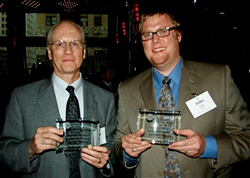For 25 years a group of University of Missouri economists has provided commodity price projections and policy analysis to the U.S. Congress, international trade negotiators, farm groups and farmers.
 On Friday, the MU Food and Agricultural Policy Research Institute (FAPRI) celebrated its silver anniversary with a gathering of friends and supporters, including Missouri Senator Kit Bond and FAPRI founder Abner Womack.
On Friday, the MU Food and Agricultural Policy Research Institute (FAPRI) celebrated its silver anniversary with a gathering of friends and supporters, including Missouri Senator Kit Bond and FAPRI founder Abner Womack.
Womack has turned over leadership of the unit started in 1984 to professors Pat Westhoff and Willi Meyers, co-directors of MU FAPRI. He continues as FAPRI adviser and professor in the Department of Agricultural Economics.
“Every acre of crop land in the world and every cow in the world’s herd are represented in our models,” Womack said of the analytical team he founded 25 years ago. “Our main job remains in giving unbiased facts, based on numbers. We don’t make policy recommendations,” Womack said. “We present the facts and let policymakers determine the answers. That is our strength.”
A silver edition Web site shows a policy timeline, a history of MU FAPRI, videos, letters and quotes from supporters.

 Global Harvest Initiative’s Symposium, Agriculture at a Crossroads will include a keynote address by U.S. Senator Richard Lugar and a roundtable on agriculture innovation and productivity challenges by the CEOs of the companies that founded the Global Harvest Initiative – Archer Daniels Midland, DuPont, John Deere, and Monsanto. Other speakers represent the World Food Prize, World Wildlife Fund and Farm Foundation, among many others.
Global Harvest Initiative’s Symposium, Agriculture at a Crossroads will include a keynote address by U.S. Senator Richard Lugar and a roundtable on agriculture innovation and productivity challenges by the CEOs of the companies that founded the Global Harvest Initiative – Archer Daniels Midland, DuPont, John Deere, and Monsanto. Other speakers represent the World Food Prize, World Wildlife Fund and Farm Foundation, among many others. For a decade now,
For a decade now,  “STEADFAST® CANINE is pleased to partner with DockDogs to promote the high demand sport of canine dock jumping. It was a rewarding experience to see these canine athletes perform at the DockDogs World Championship in Minnesota,” said Celeste Mohatt, Marketing Manager for Arenus. “We are proud to be back at DockDogs Nationals as the preferred joint health supplement.”
“STEADFAST® CANINE is pleased to partner with DockDogs to promote the high demand sport of canine dock jumping. It was a rewarding experience to see these canine athletes perform at the DockDogs World Championship in Minnesota,” said Celeste Mohatt, Marketing Manager for Arenus. “We are proud to be back at DockDogs Nationals as the preferred joint health supplement.” 
 The
The  The Farmers for the Future program took home two honorable mention awards. The first came in the Total Integrated Program category that honors projects comprising multimedia editorial content, events and programs.
The Farmers for the Future program took home two honorable mention awards. The first came in the Total Integrated Program category that honors projects comprising multimedia editorial content, events and programs. 
 Here’s another reason to be a member of the National Corn Growers Association. Now you can get your markets on your mobile phone as a new member benefit. Our friends at
Here’s another reason to be a member of the National Corn Growers Association. Now you can get your markets on your mobile phone as a new member benefit. Our friends at  If you would like to support the National Association of Farm Broadcasting Foundation then here’s one way you can do it. Place your order now for the 2009 NAFB Foundation Toy Tractor!
If you would like to support the National Association of Farm Broadcasting Foundation then here’s one way you can do it. Place your order now for the 2009 NAFB Foundation Toy Tractor!